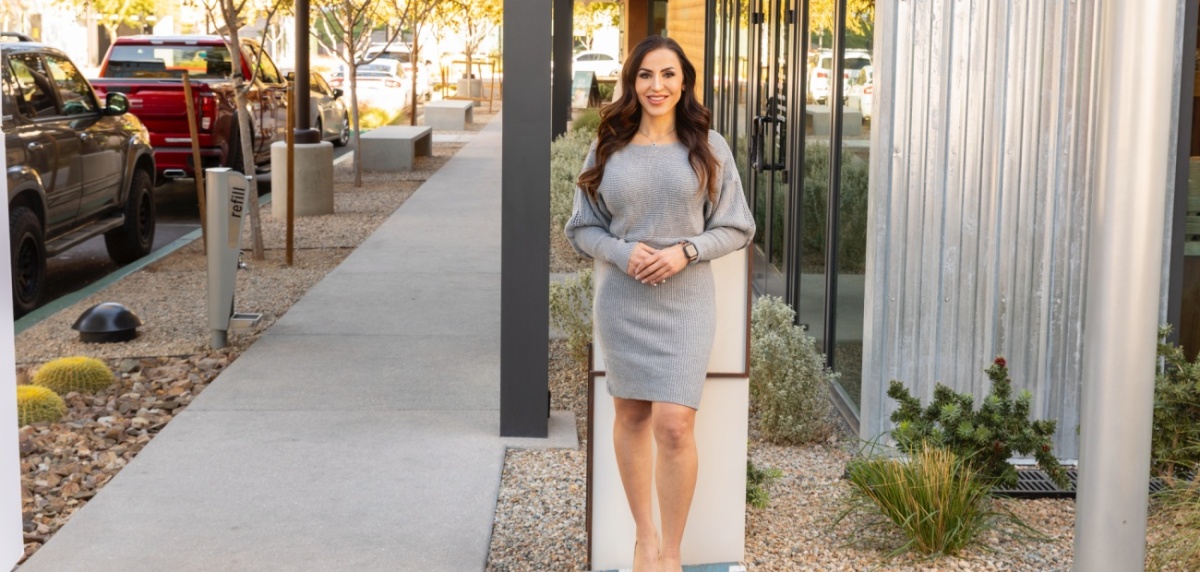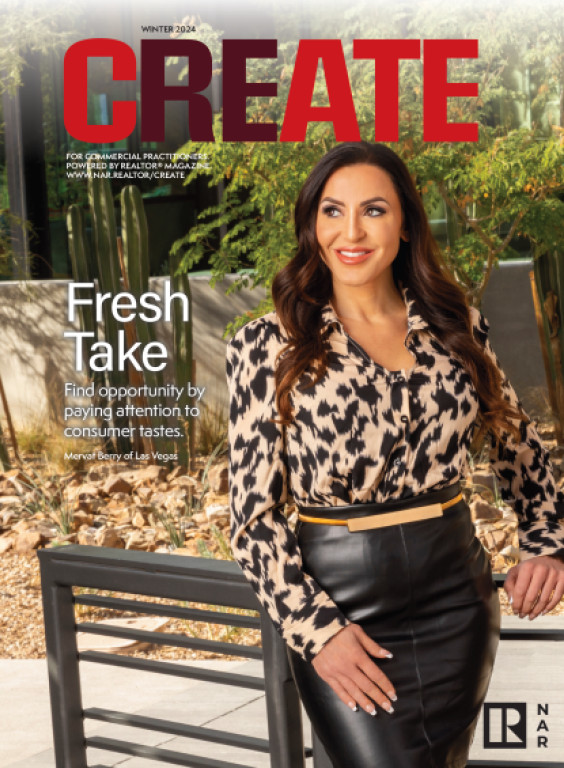Despite obstacles in the commercial real estate sector, the fundamentals remain solid for the industrial, retail and multifamily sectors, with signs of traction in some office sectors, as noted in the National Association of REALTORS®’ October 2023 commercial insights report. For enterprising brokers and agents, a challenging market breeds opportunity. Commercial practitioners who can think outside the box are finding success by paying attention to demographic shifts and lifestyle changes, understanding consumer preferences, and creatively helping tenants realize their business goals.
Where Work & Life Meet
Convenience and Amenities Draw Multifamily Tenants
While the multifamily segment remains strong, the increase in available units—up 17% compared to the same period in 2022, according to NAR—has resulted in reduced rent growth. To offset the impact on bottom lines, Mervat Berry, CCIM, an adviser with MDL Group in Las Vegas, suggests that brokers focus on mixed-use properties with access to service retail.
“People want convenience and value the walkability of the location,” says Berry, who views flat rent growth as a temporary correction to the recent spike in rental rates. Driven by the shift to remote or hybrid work, people want amenities that provide quiet, open spaces to work and social spaces to connect as a community. “Gaming rooms, pickleball courts, fitness centers and event rooms are all hot right now,” Berry says.
Most new multifamily developments cater to younger demographics—those in their 20s to 40s—who lead an active lifestyle. Berry points to UnCommons, a Las Vegas mixed-use community that uses the marketing tagline “Where work and life meet.” According to Berry, nongaming residential and retail off the Las Vegas Strip are especially hot. Knowing what the consumer wants is key.
“It’s a common misperception that a buyer needs deep pockets to invest in multifamily,” Berry says. Syndicate investors—small private investors pooling their funds—are trending in the Las Vegas market. Berry advises brokers not to fear high cap rates: “Negative leverage isn’t always bad. What’s important is to consider value-added opportunities, such as an influx of population. Housing will always be a necessity, and you can refinance a property when rates drop.”
Berry admits breaking into the multifamily institutional investor market can be challenging because many multifamily brokers have long, established relationships with institutional buyers. She credits her success to perseverance in cold calling, mailer marketing campaigns, and working industry conferences to get her name known among noninstitutional buyers in the market. “Join a team,” Berry recommends. “Even if you only get a small percentage, it will help you work your way up. If I was starting over, that’s what I would do.”
Look for Inflation-proof Retail Tenants
Understanding consumers is integral to success in the retail market, too. Despite predictions of the death of brick-and-mortar retail during the pandemic, “the demand for retail space is strong,” says Lisa Christianson, president of Christianson & Company, a Minneapolis-based commercial real estate firm. “While the consumer’s dollars are getting stretched, they are still spending, especially in strong categories. There’s opportunity for landlords to fill spaces that have been empty for some time or to upgrade their tenant mix,” she says.
Echoing Berry’s observation, Christianson says that entertainment-related retail is hot right now, along with discount retail, such as second-hand stores. “People need a place to eat and get services, but those working in the retail space must be in tune with consumers and their changing needs and interests,” she advises.
Good space is hard to find despite the appetite for retail. “There is very little new space coming online. Deals just don’t pencil with high construction and financing costs,” Christianson says, but she sees upcoming opportunities on the buy side as interest rates remain high. “Right now, we’re not seeing many distressed properties, but we do see distressed people. Clients with the capital to buy at current interest rates can count on increased value when rates come back down.”
"People need a place to eat and get services, but those working in the retail space must be in tune with consumers and their changing needs and interests.”
Commercial specialists eyeing the retail sector should know “it’s a different animal,” Christianson says. “It’s a lot of small deals with multiple moving parts. We used to look for internet-proof tenants, then pandemic-proof. Now we look for inflation-proof retailers.” Christianson advises brokers to be diligent and get to know the players in the market. “Find the smartest, brightest people doing what you want to do and find a way to work with them.”
Experiential Retail Here to Stay
“Experiential” retail is a hot sector, according to Katie Kurtz, senior vice president of business development for Brookfield Properties’ retail arm in Chicago. Among other categories, experiential encompasses brand partnerships, kiosks, and “pop-ups”—a term Kurtz has used for over 20 years.
Recent experiential examples from Brookfield’s portfolio range from a brand partnership for the Netflix series “Stranger Things,” using traditional mall retail space, to an immersive experience of Michelangelo’s Sistine Chapel in a former Sears building accommodating the high ceiling and electrical amperage requirements. “It’s not as easy as just selecting a mall and having a space that works for these nontraditional concepts. Nontraditional infrastructure is needed on many of these deals, and the available space has to be able to support that,” Kurtz says.
Beyond infrastructure, Kurtz stresses the importance of matching the experience to the community. What works in Texas won’t necessarily work in Connecticut. “Experiential is not a rubber stamp,” she says. “We might work with the same retail client, but the project won’t look the same.”
Pop-up retail—temporary shops to test a market or take advantage of a seasonal demand— are increasingly popular among established brick-and-mortar brands. “It’s a low-risk way for retailers to determine if they can do the volume necessary to be profitable,” says Kurtz. “Seasonal brands may never be interested in a five- or 10-year lease, but many pop-ups eventually become long-term leases.”
Traditional retailers are becoming extremely focused on the experience, Kurtz says. “Even direct-to-consumer online brands recognize the importance of an omnichannel experience for consumers,” she adds. “The pandemic changed how we interact outside the home, and people want different experiences.”
The win for the leasing broker and retail owner is not just short-term. Kurtz described an “event” tenant leasing a space to promote an upcoming heavy metal concert. This one-week lease will bring customers outside the typical consumer profile into a larger retail environment, potentially benefiting other tenants through increased volume.
Commercial specialists eyeing this niche must understand how it differs from traditional retail. “There aren’t many people working in this space,” she says. “Find experiential specialists at trade shows, ask about their sources for professional development, and build a network.” Kurtz invites brokers to reach out to her. “We work with brokers anywhere in the country and know what translates well to local culture.”
Creating Spaces That People Want to Visit
Florida-based Foxtail Coffee Co., a craft coffee brand, helps create unique experiences, countering the quick-service approach of most coffee shops. “People working from home want a thriving, energetic experience when they leave the house,” says Rosie Tchekmeian, Foxtail’s director of franchise development. “People will go the extra mile to find a cool and quaint space.” She stresses that while the product is consistent from location to location, Foxtail customizes each retail space to provide a local market community feel.
Currently in two states with stores in additional states opening soon, Foxtail Coffee works with brokers nationwide to identify and lease space. Las Vegas will soon be home to two Foxtail Coffee locations—affirming Berry’s observation that new retail off the Strip is a hot niche. “We look for brokers to do their homework and understand our brand is different,” Tchekmeian says.
Foxtail Coffee often leases second- and third-generation sites, including former Starbucks shops. “Being a craft coffee shop, we don’t generate Starbucks’ volume of business, so developers need to understand our business model and what we bring to the community.”
Most brokers incorrectly assume Foxtail Coffee wants an endcap or inline retail spot in an existing retail center. “We want a creative, customizable space,” Tchekmeian says. “We love taking over an old building in a regentrifying neighborhood, and the community loves it when we occupy a former eyesore. People get out of their cars to spend time in our coffee shops.”
Experiential retailers add value to the community because their customers may decide to do business elsewhere in the neighborhood.
Foxtail Coffee seeks leasing brokers with good follow-up and follow-through—helping to keep the transaction moving forward.
Urban Farms Add to Community
Lifestyle preferences toward health, fitness and sustainability also drive opportunities for unique commercial conversions. Urban farming, for one, is an increasingly popular niche that can fill unused industrial and office space.
“We are inundated every day with inquiries from owners, developers and real estate firms about redeveloping an existing commercial space into a farm,” says Jackie Potter, a farmer speaking on behalf of Area 2 Farms, which has 10 urban farms in development in the Washington, D.C.–Maryland–Virginia area. The first Area 2 Farms occupies a former paper mill in Arlington, Va., where growers are nurturing everything from microgreens to turnips.
“Farms are a natural fit for commercial conversion,” Potter says. “We provide a service to the surrounding community and have few hard requirements—and almost no tenant improvements.” Area 2 Farms requires only access to water and power and has never encountered a property with insufficient infrastructure. Municipalities often embrace urban farms because they require few zoning changes.
“All we want is a space that meets all required codes,” Potter says. “We prefer nothing but cold, dark shelves, and we’ll make it work.” Brokers seeking urban farming tenants need to understand the patience they require. “Farms take time,” Potter says. “We’re not interested in short-term partnerships—especially if offered because the market is stressed.”
The company aims to have farms within 10 miles of 90% of the U.S. population. Says Potter: “We want to work with owners who think creatively about the long-term health and wellness of their properties.”
About Create
Create is a quarterly publication for commercial practitioners, members of the National Association of REALTORS® and commercial real estate industry leaders. Members can subscribe by updating your member profile information to include commercial interests in the "Field of Business" list.




















